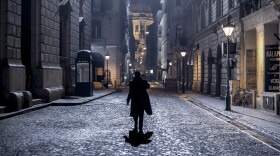Arctic has an interesting pedigree. The director and co-writer Joe Penna are Brazilian; actor Mads Mikkelsen is Danish, and the film was made in Iceland. It comes to us at a good time for such a snowy adventure film, just after the polar vortex made headlines by freezing the pants off the eastern half of the country a week ago.
The picture opens on a character named Overgard alone in a vast, white Arctic expanse, right by a wrecked airplane. He must have been the pilot, and he must have been alone, since there are no other people or bodies to be seen, He’s also obviously competent and prepared to take care of himself in emergencies. He’s set up fishing lines; he keeps his catch in a cooler, in order to make sure he has food for the days his lines are empty. He’s set up an emergency transmitter on a high point nearby. The airplane is his shelter, and he can keep warm there with a heavy sleeping bag. It’s fascinating to watch his deft movements; he’s good at tying things together, improvising tools, and doing all the things he must to survive.
It looks rather comfy, all things considered, but when a rescue helicopter crashes in swirling winds, you know that the film is going just where deep down you thought it would. If he were rescued that early in the movie, there’d be no movie, and Arctic is not about to take any unexpected paths. The situations and landscape may differ from pictures like The Martian, 127 Hours or The Revenant, but Arctic puts us right in line with the formula of “lonely man against the wilderness.”
There is a woman in the film. Although the helicopter pilot is dead, he had a companion, but she’s wounded, comatose and needs real medical care, so Overgard now has the responsibility of getting the two of them to safety. If you wanted to read Arctic as a film about women as burdens for adventuring men, you’d have a point.
It’s not OK to make fun of the struggles of human beings, even if they’re fictional, but at a certain point, Arctic starts to feel silly. Overgard’s troubles come like regular drumbeats. It’s the pacing of the Indiana Jones movies, or Jurassic Park. Overgard figures out one crisis, and – boom – comes another. When he drops out of sight without warning into a crevasse, it looks like Chaplin or Keaton in one of their silent short films. But Arctic shows not a hint of a sense of humor. You feel like calling out, “Enough already.” The crevasse incident comes after Overgard has pulled his woman-laden sled up impossibly steep hills, suffered howling winds and terrible cold (of course) and fought off a polar bear sticking its head into his snow cave. It can be excruciating, but that’s not enough.
All these tumbling events take the shape out of the movie. Overgard may have a goal in mind – he’s taking himself and the unconscious young woman to a seasonal shelter marked on a map he found in the helicopter . But the movie seems to have lost its way. Lonely men in the wilderness may be a cliché, but there’s no law that it must lead nowhere.
Director Joe Penna has also missed out on the sheer beauty of the Arctic world. Zacharias Kunuk, an Inuit filmmaker from extreme northern Canada, has made a few good feature films – including Atanarjuat, the Fast Runner and Searchers. Kunuk’s images of the Arctic landscape are literally awesome. He catches the interaction of the blue sky and the white of the snow and ice, and the magnificent line of the horizon, the sun low in the impossibly huge sky, and a few people living difficult lives in this place. Arctic misses all of that.
Arctic is somewhat engaging, but you might want something more than the technique of the adventure, and Arctic isn’t good enough to look for despair.






